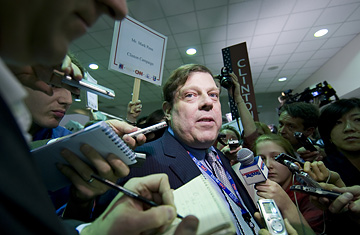
Clinton campaign advisor Mark Penn speaks to reporters following the Democratic debate at the University of Texas at Austin, February 21, 2008.
Correction Appended: April 9, 2008
When a not-yet-world-famous political consultant named Karl Rove signed up back in 1999 to become the chief strategist for Texas Governor George W. Bush's presidential campaign, his client had a non-negotiable demand: Rove had to get rid of the lucrative direct-mail business he had run for 18 years. Bush, Rove once told me, had put it in the bluntest terms. "If I do this," Rove recalled Bush telling him, "I want you free and clear."
Hillary Clinton, by contrast, never insisted on any such promise from her political guru, Mark Penn. Indeed, the potential for conflict only increased when — as Clinton was launching her Senate reelection campaign in 2005, in a test run for a potential presidential bid in 2008 — Penn was named worldwide CEO of Burson-Marsteller, one of the largest firms in the world of public relations, a field in which Washington advocacy has been playing a bigger and bigger role. Last year, Bloomberg News reported that Penn's private blog for his Burson-Marsteller colleagues included an entry titled: "Workin With Hillary.: In it, he reportedly wrote, "I have found the mixing of corporate and political work to be stimulating, enormously helpful in attracting talent, and helpful in cross-pollinating new ideas and skills." "And," he added, "I have found it good for business."
Penn has long been the most controversial figure in Clinton's political orbit, in part because his other relationships have repeatedly placed her campaign in an uncomfortable position. Among his firm's clients have been drug companies, a tuna industry group, a tobacco firm and the controversial military contractor Blackwater USA. What finally forced Penn's demotion was a Wall Street Journal report last Friday that, as part of a contract Burson-Marsteller had entered into, he had met with the Colombian ambassador to discuss promoting a free-trade agreement with that country — even as Clinton was denouncing the deal, which is vehemently opposed by many of the unions that she is counting on to support her in the make-or-break Pennsylvania primary on April 22. The news caught the rest of the Clinton high command by surprise. A campaign source says Penn had promised to keep it apprised when he had any personal dealings with Burson-Marsteller clients who might present a political embarrassment for Clinton. "This was not among that litany," the official said.
Penn's outside work does not represent the first time that this kind of conflict has arisen in a presidential campaign. In 2000, for instance, Al Gore drew fire over the fact that a key aide, Carter Eskew, had done work on a tobacco industry advertising campaign that was aimed at undermining the Clinton Administration's tobacco settlement deal. (The work had been done before Eskew joined Gores campaign, and he left the firm at Gores request when he came on board.)
